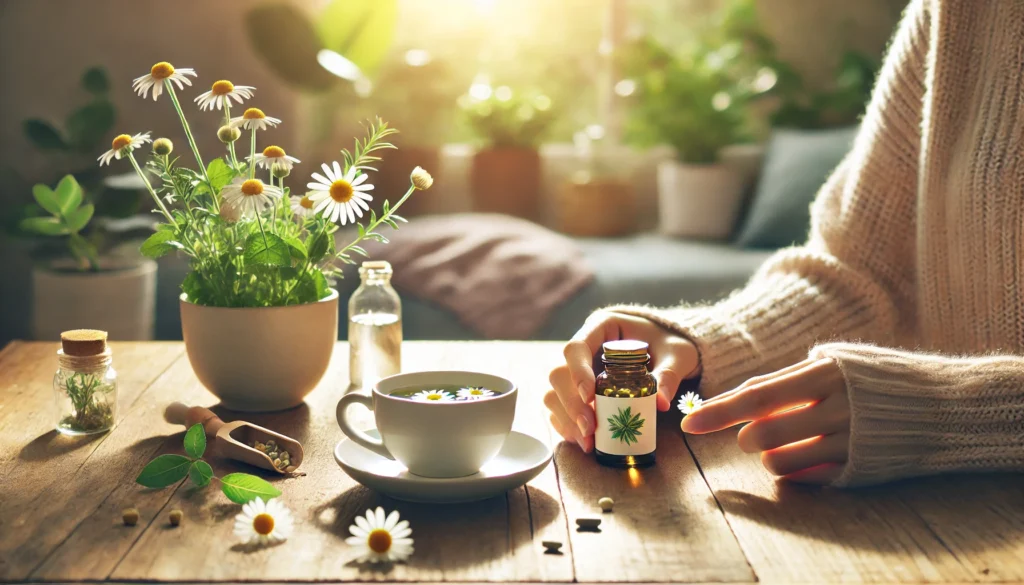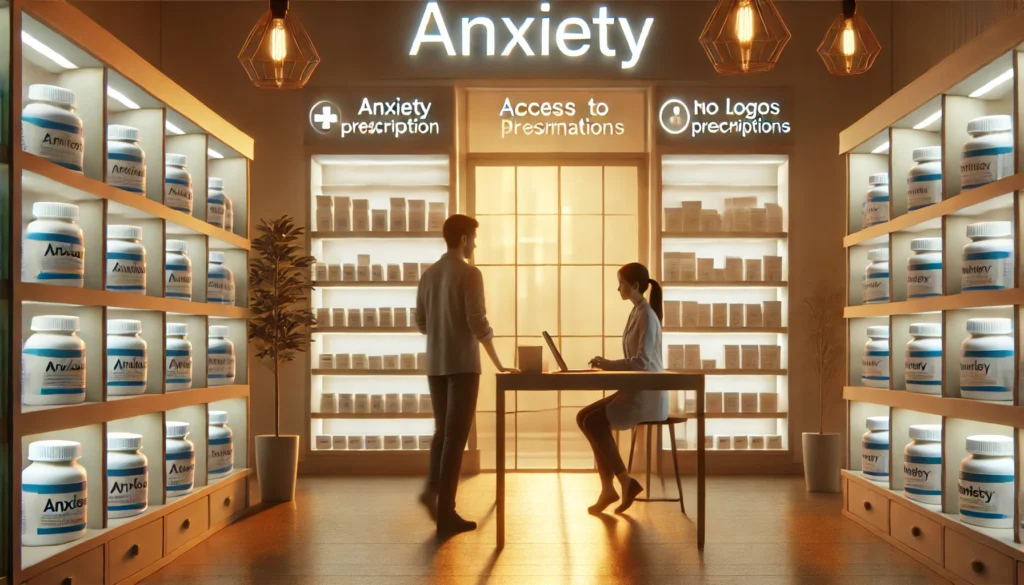Anxiety is one of the most pervasive mental health challenges of the 21st century, affecting millions of people globally across all demographics. From racing thoughts and persistent worry to physical symptoms like chest tightness and insomnia, anxiety can infiltrate daily life in deeply disruptive ways. The desire to feel better and regain a sense of emotional balance leads many to wonder, “How can I get anxiety medication?” This is a valid and important question, particularly as the conversation surrounding mental health continues to evolve. Yet, alongside this growing awareness, there has been a resurgence of interest in natural and holistic remedies. As more people seek comprehensive wellness strategies, it is crucial to explore not only how to get on anxiety medication but also whether holistic supplements may offer meaningful support.
You may also like: Best Herbal Alternatives to Anxiolytics: Natural Remedies for Anxiety Relief
Understanding the Need for Anxiety Treatment
Anxiety disorders are more than momentary stress. Generalized Anxiety Disorder (GAD), panic disorder, social anxiety, and other forms present recurring and often debilitating symptoms that significantly impair daily functioning. The decision to seek treatment is deeply personal but often rooted in a realization that anxiety is interfering with one’s quality of life. For many, this realization brings up a crucial question: how can I get anxiety meds in a way that feels safe, informed, and personalized?
The first step in this journey often involves recognizing the signs that professional help may be necessary. Persistent worry, avoidance of social situations, physical symptoms like dizziness or heart palpitations, and an ongoing sense of dread are all indicators that anxiety may be more than situational. Left untreated, these symptoms can escalate and lead to further complications, such as depression or substance use disorders. Therefore, seeking help early and understanding the range of available treatments—both conventional and alternative—is essential for long-term mental wellness.

Navigating the Process: How to Get on Anxiety Medication
For individuals who decide to explore pharmaceutical interventions, the process typically begins with a visit to a licensed healthcare provider. Whether it’s a primary care physician, psychiatrist, or psychiatric nurse practitioner, these professionals are equipped to assess symptoms and determine if medication is appropriate. The question of how to get on anxiety medication is not just about access but about receiving the right guidance tailored to your unique needs.
During an initial consultation, the provider will ask detailed questions about your symptoms, history, lifestyle, and any prior treatments. They may use standardized tools like the GAD-7 questionnaire to assess severity. This information helps in formulating a diagnosis and recommending a treatment plan, which may include selective serotonin reuptake inhibitors (SSRIs), serotonin-norepinephrine reuptake inhibitors (SNRIs), or short-term use of benzodiazepines in acute cases.
In many cases, individuals worry about being judged or dismissed when they ask, “How can I get anxiety medication?” However, mental health professionals are trained to approach these concerns with empathy and professionalism. It is important to be honest and thorough during evaluations, as this enables providers to make informed recommendations. Some providers may also request follow-up visits to monitor effectiveness and side effects, ensuring a responsible and personalized approach to medication management.
Exploring Insurance, Accessibility, and Telehealth Options
Once the decision is made to pursue medication, another layer of complexity may arise: navigating the healthcare system. Understanding insurance coverage, prescription costs, and provider networks can feel overwhelming. Fortunately, more resources are available than ever before. Many health insurance plans now include robust mental health benefits, covering both in-person visits and telehealth consultations.
The advent of virtual care has significantly expanded access to psychiatric evaluations. Through secure video platforms, individuals can now consult with licensed professionals from the comfort of home. This innovation has removed geographic barriers and made it easier for people to ask, “How can I get anxiety meds?” without the logistical challenges of in-person appointments. In areas with limited psychiatric resources, telepsychiatry offers a lifeline for those in need.
Additionally, some online platforms specialize in mental health medication management. Services like Brightside, Cerebral, and Talkiatry pair patients with licensed providers who can prescribe medications after virtual assessments. While these services may not be suitable for all cases, especially those involving complex or co-occurring conditions, they represent a valuable option for many seeking help.

Understanding Medication Classes and Their Roles
When you begin the conversation about how to get on anxiety medication, it’s helpful to understand the primary classes of drugs used in treatment. SSRIs like sertraline and escitalopram are often the first line of defense due to their proven efficacy and relatively mild side effect profile. These medications work by increasing serotonin levels in the brain, which helps regulate mood and anxiety.
SNRIs, such as venlafaxine and duloxetine, operate similarly but also affect norepinephrine, another neurotransmitter linked to anxiety and stress response. In more acute situations, providers may recommend benzodiazepines like alprazolam or lorazepam. These drugs offer fast relief but carry risks of dependence and are usually prescribed for short-term use.
Newer treatments, such as buspirone, offer an alternative for individuals who cannot tolerate SSRIs or SNRIs. Buspirone works on serotonin receptors but has a different mechanism of action, making it suitable for long-term use without the same dependency risks. It is crucial to follow your provider’s guidance and engage in regular check-ins to assess the medication’s impact.
Frequently Asked Questions: Anxiety Medication and Holistic Alternatives
What steps should I take before asking a doctor how to get on anxiety medication?
Before you speak to a healthcare provider about how to get on anxiety medication, it is helpful to document your symptoms, noting when they began, how often they occur, and what triggers them. Bringing a symptom journal to your appointment not only helps the provider make an accurate diagnosis, but also demonstrates your commitment to your mental health. Being proactive in tracking patterns can reveal if your anxiety is situational, chronic, or possibly related to another underlying condition. Additionally, consider researching basic information about available medications so you can ask informed questions during your consultation. Understanding your own mental health landscape before asking how to get on anxiety medication will empower you to engage more effectively in the decision-making process.
How can I get anxiety meds if I live in a rural area with limited access to specialists?
Living in a rural location no longer means you are without options when it comes to mental health care. One of the most effective ways to overcome geographic barriers is by utilizing telehealth platforms, which have grown rapidly in recent years. These platforms connect you with licensed providers who can prescribe medication after a virtual consultation. If you’re wondering how can I get anxiety meds when there are no psychiatrists nearby, telemedicine offers a viable and increasingly common solution. You can also consult your primary care physician, who may be able to start you on appropriate treatment or provide a referral.
Are there specific questions I should ask during my appointment to better understand how to get on anxiety medication?
Absolutely, preparation is key to making the most of your appointment. Ask your provider about the different types of medications available, how long they typically take to work, and what side effects you might experience. Also inquire about interactions with other medications or supplements you are currently taking. Understanding these factors gives you a clearer picture of the path ahead and helps build trust with your provider. These types of questions not only demonstrate your engagement but also deepen your understanding of how to get on anxiety medication safely and responsibly.
What if I’m not comfortable with traditional medications—how can I get anxiety meds that are more natural or low-risk?
If you’re hesitant about standard pharmaceutical options, be open about your preferences during your consultation. Some providers are receptive to starting with low-dose or non-addictive medications like buspirone or prescribing as-needed options with minimal side effects. For those wondering how can I get anxiety medication that aligns with a holistic lifestyle, it’s important to find a provider who values integrative care. You might also explore prescriptions that pair well with natural therapies, such as cognitive behavioral therapy (CBT) or adaptogenic supplements. The key is to collaborate on a plan that meets both your comfort level and therapeutic needs.
Can I use holistic supplements while taking prescription anxiety medication?
Yes, but with caution and supervision. Many people benefit from combining both traditional and natural treatments, but it’s essential to consult a provider familiar with integrative medicine. Certain herbal supplements, such as St. John’s Wort, can interfere with SSRIs and may reduce their effectiveness or increase the risk of side effects. Others, like ashwagandha or magnesium glycinate, are often better tolerated and considered safe alongside prescription medications. If you’re actively learning how to get on anxiety medication, ask your doctor which holistic options can complement your treatment without causing harm.
Is it possible to stop anxiety medication after starting, and what should I know before making that decision?
Yes, but it requires a well-planned strategy under medical supervision. Anxiety medications, particularly SSRIs or SNRIs, often need to be tapered gradually to avoid withdrawal symptoms. A common misconception is that once you feel better, you no longer need medication, but stopping abruptly can lead to relapse. If you’re navigating how to get on anxiety medication, it’s equally important to understand how to transition off it when appropriate. Discussing a long-term management plan with your provider from the outset will prepare you for both continuity and eventual change.
How can I get anxiety meds discreetly if I’m worried about stigma?
Concerns about stigma are common, but your mental health deserves attention just like any physical health issue. To maintain privacy, consider using telehealth services, which allow you to consult with a provider and receive prescriptions without visiting a physical office. Many online pharmacies also offer discreet shipping, ensuring confidentiality. If you’re asking how can I get anxiety meds without feeling exposed, remember that HIPAA laws protect your medical information, and you have a right to privacy. You may also consider joining online support groups where others share similar concerns and coping strategies.
Are there alternative ways to manage anxiety if I’m still deciding how to get on anxiety medication?
Certainly. If you’re still exploring whether medication is the right choice, there are several evidence-based practices worth trying. Cognitive behavioral therapy (CBT), mindfulness-based stress reduction (MBSR), and lifestyle changes like regular exercise or improved sleep hygiene have all shown significant benefits for anxiety. Nutritional support, such as increasing omega-3 intake or incorporating adaptogenic herbs, may also contribute to emotional stability. While these may not fully replace medication for everyone, they provide meaningful support while you’re figuring out how to get on anxiety medication or whether you even need it. This phased approach allows for gradual exploration without feeling pressured.
What should I do if the first anxiety medication doesn’t work for me?
Finding the right medication often involves some trial and error, and this is a normal part of the process. Your body chemistry, genetics, and lifestyle can all influence how you respond to treatment. If your first prescription doesn’t help or causes side effects, communicate openly with your provider rather than discontinuing it abruptly. They may adjust the dose, switch medications, or suggest adding a complementary therapy. Understanding how to get on anxiety medication includes knowing that persistence and patience are essential for long-term success.
How can I get anxiety medication if I don’t have health insurance?
Not having insurance can feel like a barrier, but there are still several options available. Community health clinics often provide mental health services on a sliding scale based on income. Some pharmaceutical companies also offer patient assistance programs for commonly prescribed anxiety medications. Telehealth services may offer affordable, subscription-based care that includes consultations and prescriptions. If you’re asking how can I get anxiety medication without insurance, it helps to research local nonprofit organizations or university-based mental health programs that offer reduced-cost services. You may also explore generic versions of medications, which are significantly less expensive than brand-name drugs.

Integrating Holistic Approaches Alongside Medication
While conventional medications can be life-changing, they are not the only path to relief. Increasingly, individuals are looking to complement pharmacological treatments with natural and holistic strategies. This integrated approach can address the multifaceted nature of anxiety, supporting both physical and emotional well-being. For example, mindfulness practices, dietary changes, and herbal supplements can play a vital role in anxiety management.
Adaptogens, a class of herbal remedies known for their ability to help the body adapt to stress, have gained popularity in recent years. Ashwagandha, Rhodiola rosea, and holy basil are among the most studied, with some clinical evidence suggesting they may help modulate cortisol levels and improve resilience to stress. While not a substitute for medication, these supplements can enhance one’s overall response to anxiety when used under professional supervision.
It is essential to consult with a healthcare provider before combining holistic supplements with prescription medications, as interactions can occur. For instance, St. John’s Wort, often used for mood enhancement, can interfere with the efficacy of SSRIs. A coordinated care plan that includes both conventional and holistic perspectives ensures safety and effectiveness.
natural anxiety relief, herbal anxiety remedies, adaptogens for stress, holistic anxiety support, supplements for mental wellness, calming herbal supplements, ashwagandha benefits, Rhodiola for anxiety, non-prescription anxiety treatments, natural mood boosters, integrative mental health, stress management supplements, herbal solutions for anxiety, mental health and nutrition, anxiety and gut health, serotonin boosting foods, natural therapies for anxiety, alternative treatments for anxiety, mental wellness strategies, lifestyle changes for anxiety
Further Reading:
How to treat anxiety naturally
Herbal treatment for anxiety: Is it effective?
6 Natural Products to Help Alleviate Anxiety
Disclaimer
The information contained in this article is provided for general informational purposes only and is not intended to serve as medical, legal, or professional advice. While NewsHealthWatch strives to present accurate, up-to-date, and reliable content, no warranty or guarantee, expressed or implied, is made regarding the completeness, accuracy, or adequacy of the information provided. Readers are strongly advised to seek the guidance of a qualified healthcare provider or other relevant professionals before acting on any information contained in this article. NewsHealthWatch, its authors, editors, and contributors expressly disclaim any liability for any damages, losses, or consequences arising directly or indirectly from the use, interpretation, or reliance on any information presented herein. The views and opinions expressed in this article are those of the author(s) and do not necessarily reflect the official policies or positions of NewsHealthWatch.

